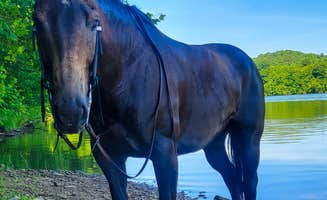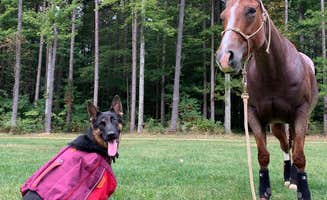Salt Fork State Park features diverse equestrian trails throughout its 17,229 acres with dedicated horse camping facilities. The park's equestrian campground connects directly to multiple trail systems with varying difficulty levels suitable for beginner to advanced riders. Equestrian campers have access to separate recreation areas, providing opportunities to rotate between riding days and rest days without leaving the park.
What to do
Trail riding: Salt Fork's extensive equestrian trail network offers options for various skill levels. According to a visitor, "The trails that lead along shore line to old stone house built in early days of Ohio" provide historical context while riding. The park also connects to "Caves to be explored that are easy to access" for a break from horseback activities.
Lake activities: When not riding, take advantage of Pleasant Hill Lake Park Campground's water recreation options. "The lake is an all sport lake so there is fishing, tubing, jet skis and kayaking. The marina has boat rentals available," reports one camper, making it easy to balance riding with water activities.
Wildlife viewing: The forests around equestrian camping areas support diverse wildlife. At Mohican State Park Campground, one visitor noted, "We love this park! Lots of hiking! Even saw a bald eagle this trip," indicating the potential for wildlife sightings while exploring the trails.
What campers like
Clean facilities: The equestrian campground maintains dedicated facilities for riders. At Dillon State Park Campground, campers appreciate that "the grounds are well kept" with "the buildings (while a bit long in the tooth) are well maintained," similar to the equestrian facilities at Salt Fork.
Spacious campsites: Riders value the ability to spread out with their horses and gear. One camper at Mohican Wilderness notes, "even though it's a large park the sites are huge so you still feel like you can kick back and relax," providing ample room for equestrian equipment.
Water access: Many equestrian campers appreciate the ability to cool off after riding. At West Branch State Park, "We can launch our kayaks right from our campsite" and "There is a small beach at the campground but a larger one on the other side of the lake," offering multiple water access points for horse owners looking to relax after trail rides.
What you should know
Reservation timing: For equestrian camping near Dundee, Ohio, planning ahead is essential. At West Branch State Park Campground, "Make reservations! (6 months in advance). Waterside sites fill up quickly!" This applies to equestrian sites as well, which tend to book rapidly during peak riding seasons.
Trail conditions: Trail maintenance varies seasonally. "TICK WARNING!!!! After a morning hike down wooded Trail, we spent A LONG TIME pulling ticks from dogs...even though the temps were in the 30's overnight," reports a Salt Fork visitor, highlighting the importance of tick prevention for both horses and riders.
Cellular coverage: Communication options vary across parks. At Mohican State Park Campground, "No cell service with Verizon at this park," which affects trail navigation apps and emergency communications. Plan accordingly with offline maps and emergency contingencies.
Tips for camping with families
Multi-activity options: Families with both riders and non-riders need diverse activities. At Canton / East Sparta KOA Holiday, "Took the family there and loved it. It's clean and quiet. Took the kids on the horse ride and they loved it," showing how parks with structured riding programs can accommodate mixed-interest families.
Playground access: Children benefit from dedicated play areas between trail rides. Salt Fork provides "playgrounds for the children" similar to West Branch where they offer a "Nice playground with toy stocked sandpit, volleyball net" that keeps younger family members engaged.
Educational opportunities: Incorporate learning into the equestrian experience. Near Jefferson Lake, "Trails that lead along shore line to old stone house built in early days of Ohio" provide educational value. Some parks offer interpretive programs about local wildlife and ecosystem management related to horse trails.
Tips from RVers
Site leveling challenges: RV sites at equestrian campgrounds often require preparation. At West Branch, one camper noted their "site was labeled slight slope. That was a joke. We were only off 2 inches side to side but front to back we had to lower the front 15 inches," indicating the need to bring proper leveling equipment.
Electric hookups: Verify electrical service at equestrian sites. While Jefferson Lake State Park has "Only 5 electric sites," most equestrian campgrounds offer limited electric options, requiring advance booking for those needing power for horse-related equipment.
Access roads: Consider trailer access when selecting an equestrian campground. At Hidden Hollow Campground, "All paved sites with picnic tables" and good access roads make it easier to navigate with horse trailers, though this campground doesn't offer specific equestrian facilities.



